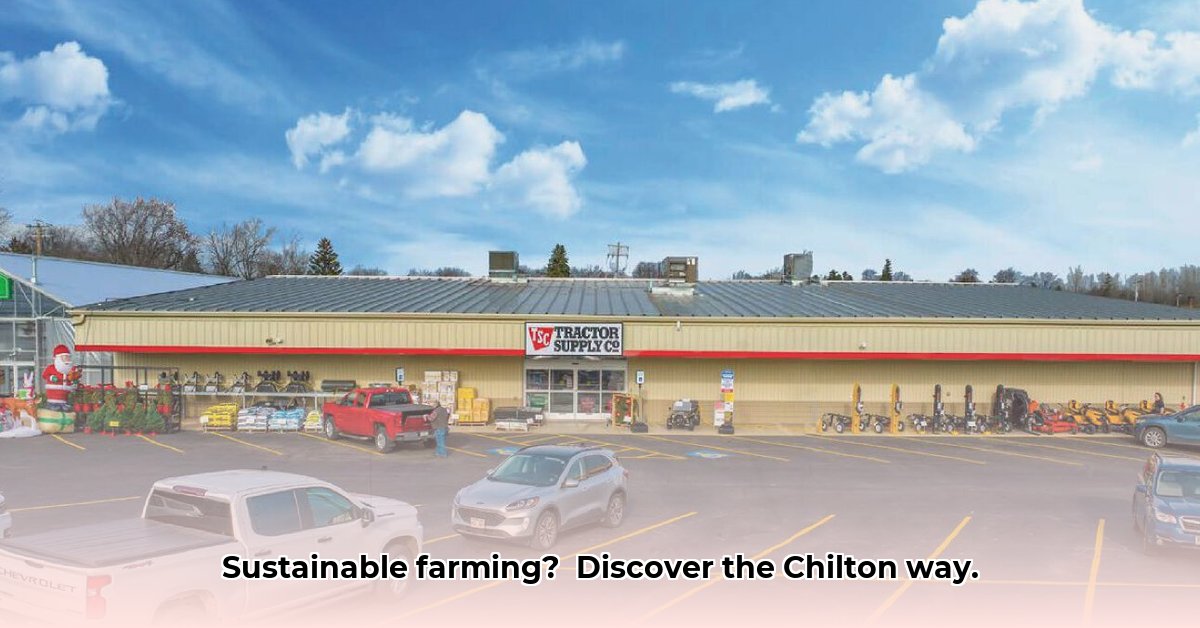
Chilton Tractor Supply (CTS), a ubiquitous presence in rural America, occupies a powerful position within the agricultural landscape. Farmers rely on CTS for a vast array of supplies, from tractor parts to animal feed, making it a crucial one-stop shop. This convenience, however, comes with a critical question: how effectively does CTS support sustainable farming practices? This investigation delves into CTS's role in sustainable agriculture, examining both its current contributions and the significant opportunities for improvement. For more information on a local CTS store, check out this example location.
The Reality Check: CTS and Sustainable Practices
CTS cultivates a brand image centered around "Life Out Here," suggesting a deep connection to the land and its preservation. But does this image accurately reflect CTS's contributions to sustainable farming? While the company offers an extensive product catalog, the availability of sustainable alternatives often falls short. Finding organic seeds or eco-friendly packaging, for instance, can be surprisingly difficult. This discrepancy between marketing and reality raises crucial questions about CTS's commitment to environmental responsibility. A significant challenge lies in bridging the gap between the company's image and its actual sustainable practices.
Imagine Sarah, a fourth-generation farmer in Iowa, who relies on CTS for many of her supplies. She aspires to transition to organic farming but consistently struggles to find a sufficient selection of organic seeds at her local CTS store. This highlights a widespread concern: the disconnect between the image CTS projects and the limited sustainable options available to farmers actively seeking environmentally responsible practices.
A Roadmap to a Greener Future: Actionable Steps for CTS
Successfully integrating sustainability into CTS's business model requires a multifaceted strategy that prioritizes impactful change. Here is a proposed roadmap:
Comprehensive Environmental Assessment: A thorough audit of CTS's operations, encompassing supply chains, packaging, and distribution, is paramount. This assessment will pinpoint areas for improvement and inform targeted interventions.
Showcase Existing Sustainable Options: Proactive promotion of CTS's current eco-friendly product offerings immediately demonstrates a commitment to sustainability. Highlighting these products enhances their visibility and encourages customer adoption.
Invest in Sustainable Product Innovation: CTS must significantly expand its selection of sustainable products. This includes actively sourcing and stocking organic seeds, compost, water-efficient irrigation systems, and other tools that support sustainable farming practices.
Education and Community Engagement: TSC should offer workshops, online resources, and in-store consultations on sustainable farming techniques. Partnering with local environmental organizations will enhance outreach, build trust, and create a lasting impact.
Transparency and Accountability: Regular sustainability reports, openly detailing progress, challenges, and areas for improvement, are necessary to foster trust and accountability. Honest reporting builds credibility with customers and stakeholders alike.
Assessing the Risks: Navigating the Path Forward
CTS faces several risks in its transition towards greater sustainability. Successfully mitigating these risks is crucial for long-term success.
| Risk Factor | Likelihood | Impact | Mitigation Strategy |
|---|---|---|---|
| Failure to adapt to sustainable trends | High | High | Proactive investment in sustainable practices and transparent supply chain information. |
| Negative consumer perception (greenwashing) | Medium | Medium | Transparent reporting on sustainability efforts, acknowledging limitations and areas for improvement. |
| Increased competition (sustainable products) | Medium | Medium | Differentiation through unique product offerings, strong branding, and community engagement. Focus on building expertise and trust. |
| Supply chain disruptions (sustainable materials) | Medium | Medium | Diversifying sustainable material suppliers and building strong, strategic partnerships. |
The Future: A Sustainable Chilton Tractor Supply
The future success of CTS hinges upon its ability to effectively integrate sustainability into its core business model. By proactively addressing its shortcomings and embracing ambitious change, CTS can contribute positively to environmental conservation while securing a leading role in the evolving market. This transition offers a win-win scenario: positive impact on the environment and enhanced business resilience. Failure to adapt, however, risks being left behind as consumer and farmer demand for sustainable solutions continues to grow.
Key Takeaways:
- CTS holds a powerful position in rural retail, yet its current emphasis on sustainable products remains insufficient.
- A significant gap exists between CTS's brand image and its actual contributions to sustainable agricultural practices.
- A range of actionable steps, from expanding sustainable product lines to enhancing farmer education, can propel significant progress.
- Transparent reporting and community engagement are instrumental in generating trust and building a sustainable future.
- The future of CTS depends on its ability to adapt to the growing demand for environmentally conscious agricultural practices.